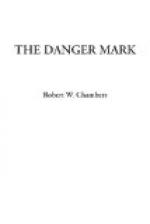As the young fellow turned and passed beneath the car-windows, he caught a glimpse above him of a heavy-jowled, red face into which a cigar was stuck—a perfectly enormous expanse of face with two little piglike eyes almost buried in the mottled fat.
“That’s Max Moebus,” observed a train hand respectfully, as Duane passed close to him; “I guess there’s more billions into that there private car than old Pip’s crowd can dig out of their pants pockets on pay day.”
A little, dry-faced, chin-whiskered man with a loose pot-belly and thin legs came waddling along, followed by two red-capped negroes with his luggage. He climbed up the steps of the “Cyane”; the train man winked at Duane, who had turned to watch him.
“Amos Flack,” he said. “He’s their ‘lobbygow.’” With which contemptuous information he spat upon the air-brakes and, shoving both hands into his pockets, meditatively jingled a bunch of keys.
* * * * *
The club was absolutely deserted that night; Duane dined there alone, then wandered into the great empty room facing Fifth Avenue, his steps echoing sharply across the carpetless floor. The big windows were open; there was thunder in the air—the sonorous stillness in which voices and footsteps in the street ring out ominously.
He smoked and watched the dim forms of those whom the heat drove forth into the night, men with coats over their arms and straw hats in their hands, young girls thinly clad in white, bare-headed, moving two and two with dragging steps and scarcely spirit left even for common coquetry or any response to the jesting oafs who passed.
Here and there a cruising street-dryad threaded the by-paths of the metropolitan jungle; here and there a policeman, gray helmet in hand, stood mopping his face, night-club tucked up snugly under one arm. Few cabs were moving; at intervals a creaking, groaning omnibus rolled past, its hurricane deck white with the fluttering gowns of women and young girls.
Somebody came into the room behind him; Duane turned, but could not distinguish who it was in the dusk. A little while later the man came over to where he sat, and he looked up; and it was Dysart.
There was silence for a full minute; Dysart stood by the window looking out; Duane paid him no further attention until he wheeled slowly and said:
“Do you mind if I have a word with you, Mallett?”
“Not if it is necessary.”
“I don’t know whether it is necessary.”
“Don’t bother about it if you are in the slightest doubt.”
Dysart waited a moment, perhaps for some unpleasant emotion to subside; then:
“I’ll sit down a moment, if you permit.”
He dropped into one of the big, deep, leather chairs and touched the bell. A servant came; he looked across at Duane, hesitated to speak:
“Thank you,” said Duane curtly. “I’ve cut it out.”




